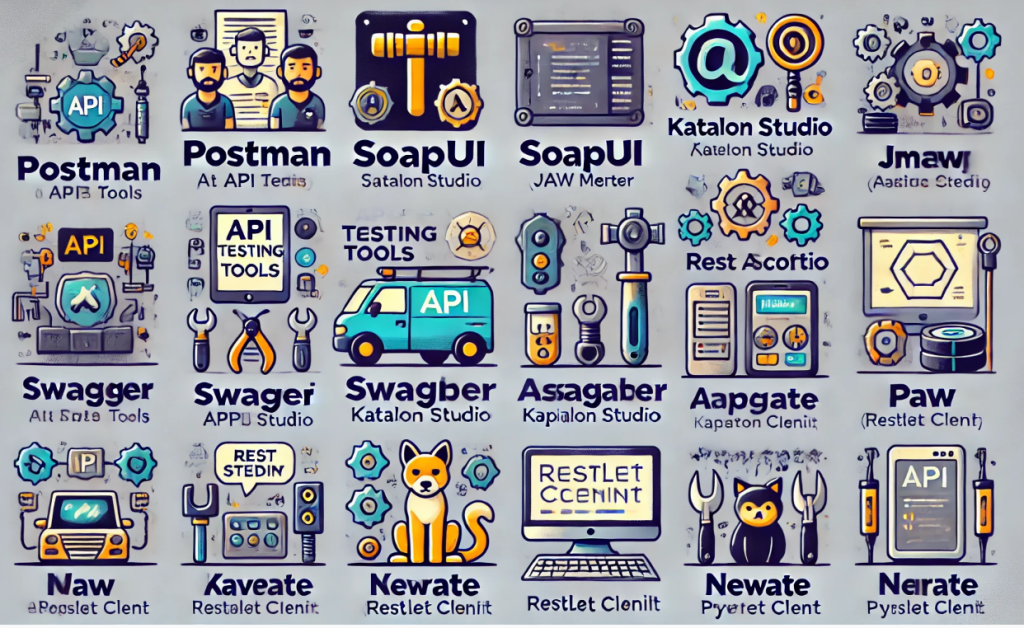
API testing is a type of software testing that focuses on validating the functionality, reliability, performance, and security of Application Programming Interfaces (APIs). Since APIs communicate without a graphical user interface (GUI), testing occurs at the message layer, simulating how applications would interact with the API.
Here’s a breakdown of why API testing is important:
- Early Bug Detection: By testing APIs early in the development lifecycle, you can identify and fix bugs before they impact the user experience.
- Improved Reliability: API testing helps ensure that the API behaves consistently and as expected under various conditions.
- Enhanced Security: Testing can uncover security vulnerabilities in the API that could be exploited by malicious actors.
- Faster Development: Automated API tests can streamline the development process by allowing for quicker regression testing after code changes.
- Reduced Costs: Catching and fixing bugs early reduces the overall cost of development and maintenance.
Here are some of the common types of API tests:
- Functionality Testing: This involves verifying if the API endpoints perform the intended actions correctly according to their specifications.
- Performance Testing: This assesses how the API responds under load, measuring factors like response time and throughput.
- Security Testing: This focuses on identifying and mitigating security vulnerabilities in the API, such as injection attacks or unauthorized access.
- Load Testing: This simulates a high volume of traffic to assess the API’s ability to handle peak usage periods.
API testing can be performed manually or by using automated testing tools. Manual testing involves sending requests to the API and analyzing the responses to ensure they meet expectations. Automated testing tools can streamline this process by allowing you to write scripts that can send a large number of test requests and automatically verify the responses.
Here are some additional points to consider about API testing:
- API Documentation: Good API documentation is essential for effective testing. It should clearly define the API endpoints, request formats, response structures, and expected behavior.
- Testing Tools: There are many API testing tools available, both open-source and commercial. Popular options include Postman, SoapUI, and RestAssured.
- Shifting Left: The concept of “shifting left” encourages testing APIs earlier in the development lifecycle to catch issues as soon as possible.
By incorporating API testing into your development process, you can ensure that your APIs are well-functioning, secure, and meet the needs of your users.
List API testing Tools
Here is a list of popular API testing tools, along with a brief description of each:
1. Postman
- Overview: A powerful and popular tool for API development, testing, and documentation.
- Features: Create and run requests, automate tests, monitor API performance, and generate API documentation.
- Website: Postman
2. SoapUI
- Overview: A widely-used open-source tool for testing SOAP and REST APIs.
- Features: Functional testing, load testing, security testing, and automation capabilities.
- Website: SoapUI
3. Insomnia
- Overview: A powerful HTTP and GraphQL client for testing and debugging APIs.
- Features: Simple and intuitive interface, request chaining, environment variables, and support for multiple authentication methods.
- Website: Insomnia
4. Swagger Inspector
- Overview: An online tool for testing and documenting APIs, part of the Swagger ecosystem.
- Features: Validate and test API endpoints, generate OpenAPI definitions, and create API documentation.
- Website: Swagger Inspector
5. Apigee
- Overview: A full-lifecycle API management platform by Google Cloud that includes API testing capabilities.
- Features: Design, secure, deploy, and monitor APIs, with built-in testing and analytics.
- Website: Apigee
6. Katalon Studio
- Overview: An automation testing tool that supports web, mobile, and API testing.
- Features: Comprehensive testing framework, built-in keywords for REST and SOAP, and integration with CI/CD pipelines.
- Website: Katalon Studio
7. JMeter
- Overview: An open-source tool primarily used for performance and load testing, but also supports functional API testing.
- Features: Extensive protocol support, customizable test plans, and integration with CI/CD.
- Website: JMeter
8. Newman
- Overview: A command-line companion for Postman that allows you to run and test Postman collections.
- Features: Integrate with CI/CD pipelines, run tests locally, and generate reports.
- Website: Newman
9. RestAssured
- Overview: A Java library for testing RESTful services.
- Features: Simple syntax for writing tests, support for XML and JSON requests/responses, and integration with popular Java testing frameworks.
- Website: RestAssured
10. Tavern
- Overview: A Python-based tool for testing RESTful APIs.
- Features: YAML-based test cases, easy integration with pytest, and support for complex testing scenarios.
- Website: Tavern
11. Paw
- Overview: A full-featured HTTP client for Mac that helps with API testing.
- Features: Advanced request editing, response validation, and support for various authentication methods.
- Website: Paw
12. Assertible
- Overview: An API testing and monitoring tool designed for continuous integration and delivery.
- Features: Automated testing, scheduled tests, integrations with CI/CD tools, and detailed reporting.
- Website: Assertible
I’m a DevOps/SRE/DevSecOps/Cloud Expert passionate about sharing knowledge and experiences. I am working at Cotocus. I blog tech insights at DevOps School, travel stories at Holiday Landmark, stock market tips at Stocks Mantra, health and fitness guidance at My Medic Plus, product reviews at I reviewed , and SEO strategies at Wizbrand.
Do you want to learn Quantum Computing?
Please find my social handles as below;
Rajesh Kumar Personal Website
Rajesh Kumar at YOUTUBE
Rajesh Kumar at INSTAGRAM
Rajesh Kumar at X
Rajesh Kumar at FACEBOOK
Rajesh Kumar at LINKEDIN
Rajesh Kumar at PINTEREST
Rajesh Kumar at QUORA
Rajesh Kumar at WIZBRAND

